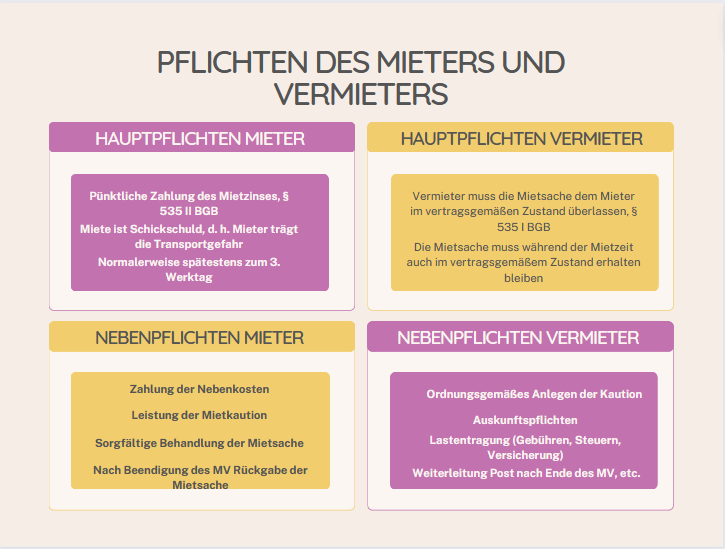Berlin Court of Appeal, April 13, 2015, Case No. 8 U 212/14
According to Section 546 (1) of the German Civil Code (BGB), the tenant is obligated to return the rented property to the landlord after the termination of the rental agreement. This also means that the tenant is required to remove everything that belongs to them from the rental property.
If the tenant leaves behind some essential items in the apartment despite this obligation, it only constitutes a partial clearance of the apartment, meaning that the tenant has not fulfilled their obligation to vacate the premises. In such a case, the landlord may still file an eviction lawsuit against the tenant.
However, if the tenant has only left behind insignificant clutter and a few boxes, the eviction obligation may still be considered fulfilled.
In the aforementioned case of the Berlin Court of Appeal, the court had to decide whether the tenant had fulfilled their obligation to vacate the premises despite leaving some furniture in the basement of the commercial premises and who should bear the costs of the subsequent legal dispute over the eviction.
Facts of the Case:
The landlord had rented out commercial premises and terminated the lease without notice due to payment arrears.
In this case, the plaintiff was the landlord of commercial premises, which they had rented to the defendant tenant. After the defendant failed to pay the rent several times, the plaintiff terminated the lease without notice.
Subsequently, the defendant also delayed vacating and handing over the rental premises, leading the plaintiff to file a lawsuit for eviction and handover.
Before the lawsuit was served to the defendant, the defendant vacated the commercial premises and returned them to the plaintiff by handing over the keys. The parties also prepared a handover protocol.
Tenant Left Behind Bulky Waste and Furnishings in the Rental Premises
Despite this, the plaintiff later insisted on the tenant’s conviction because the tenant had left behind bulky waste in the basement and certain furnishings in the main rental rooms. The initially contacted Regional Court followed the landlord’s view and sentenced the tenant accordingly for eviction and handover. The defendant then appealed against this decision.
Landlord Filed Eviction Lawsuit, Then Withdrew the Lawsuit and Sought Cost Reimbursement
In the subsequent appeal proceedings, the landlord then withdrew the lawsuit. The defendant then sought the conviction of the plaintiff, arguing that the plaintiff should bear the costs of the legal dispute to the extent that they were incurred due to the delayed withdrawal of the lawsuit.

Decision of the Berlin Court of Appeal:
The Court of Appeal ruled that the landlord must bear the costs.
The Berlin Court of Appeal followed the defendant’s view and ruled that the plaintiff should bear the costs.
According to Section 269 (3) of the Code of Civil Procedure (ZPO), the plaintiff would generally be liable for the costs if they withdrew their lawsuit. An exception to this is regulated by Section 269 (3) sentence 3 ZPO. According to this provision, the cost liability is determined at the court’s discretion, taking into account the previous state of facts and the dispute when the reason for the lawsuit ceases to exist before the lawsuit is formally pending.
The eviction and handover lawsuit, which was filed with the Regional Court on March 28, 2014, was admissible and well-founded until the commercial premises were vacated and handed over to the plaintiff on May 8, 2014, i.e., before the lawsuit was formally pending on May 15, 2014.
The lease was effectively terminated by the plaintiff’s notice of termination dated February 14, 2014, due to payment arrears (Section 543 (2) No. 3 (b) BGB), so the plaintiff had a claim for eviction and handover.
The defendant was also in default of vacating and handing over the premises. It is, therefore, at the court’s discretion to impose the court costs and the attorney’s procedural fee for both legal representatives on the defendant.
The Tenant Fulfilled the Obligation to Vacate Before the Lawsuit Was Formally Pending
Contrary to the view of the Regional Court, the defendant fulfilled the obligation to vacate the premises before the lawsuit was formally pending (Section 362 (1) BGB).
The tenant’s obligation to return the property includes, in addition to granting possession of the premises to the landlord (also by returning all keys), the removal of items brought into the premises. Vacating the premises is an essential element of the return, with the condition of the premises upon return being generally irrelevant.
Partial Clearance Only Exists When Items Still Belong to the Tenant
A partial clearance only exists if there are still items in the premises over which the tenant has not obviously relinquished possession. A distinction can also be made based on whether the landlord can take possession of the premises based on their condition. If the tenant leaves behind a significant amount of items belonging to them, this should be considered an improper partial clearance. However, leaving behind a small amount of clutter does not preclude the assumption of a proper return.
The claim for eviction and handover became unfounded due to fulfillment before the hearing at the Regional Court. It is, therefore, at the court’s discretion to impose the additional costs on the plaintiff, which arose due to the delayed withdrawal of the lawsuit – only in the appellate court.
Source: Berlin Higher Regional Court
Important Note: The content of this article has been prepared to the best of our knowledge and belief. However, due to the complexity and constant evolution of the subject matter, we must exclude liability and warranty. Important Notice: The content of this article has been created to the best of our knowledge and understanding. However, due to the complexity and constant changes in the subject matter, we must exclude any liability and warranty.
If you need legal advice, feel free to call us at 0221 – 80187670 or email us at info@mth-partner.de.
Lawyers in Cologne provide advice and representation in tenancy law.

